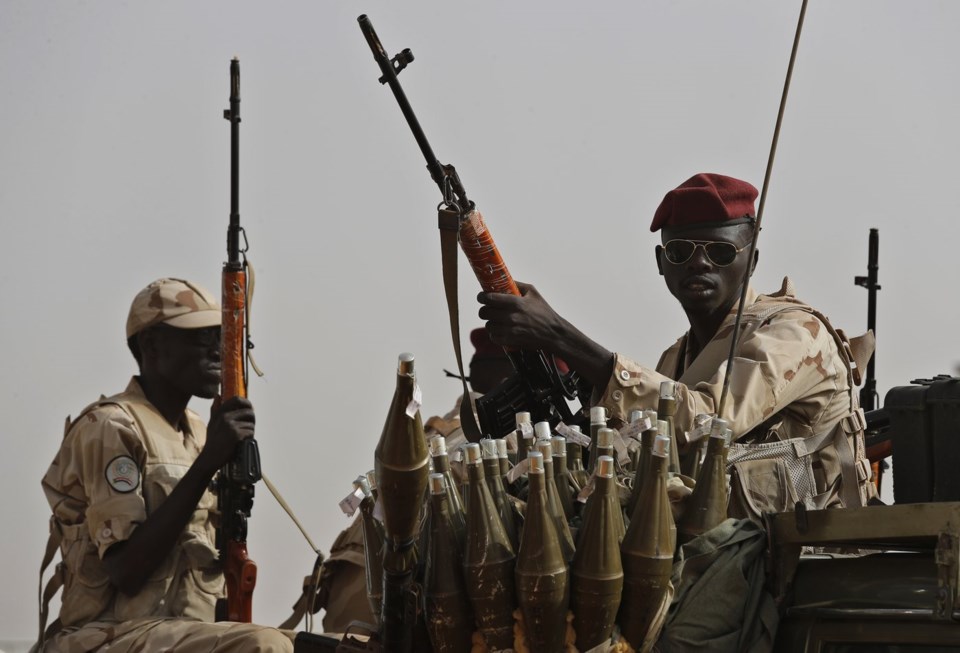UNITED NATIONS (AP) — The U.N. Security Council adopted a resolution Thursday demanding that Sudan’s paramilitary force immediately halt its siege of the only capital in the vast western region of Darfur that it doesn’t control and where more than a million people are reportedly trapped.
The British-sponsored resolution, which was approved by a vote of 14-0 with Russia abstaining, also calls on the paramilitary Rapid Support Force and Sudanese military “to seek an immediate cessation of hostilities” leading to an end to their more than year-long war.
It expresses “grave concern” at the spreading violence and credible reports that the Rapid Support Forces are carrying out “ethnically motivated violence” in El Fasher, the capital of North Darfur, as well as last year in El Geneina in West Darfur.
Britain’s U.N. Ambassador Barbara Woodward told the council after the vote that the resolution sends a clear message: the RSF must “immediately stop the siege of El Fasher and that all sides step back from the brink.”
“An attack on the city would be catastrophic for the 1.5 million people sheltering in the city,” she warned. “This brutal and unjust conflict must end.”
Sudan plunged into conflict in mid-April 2023, when long-simmering tensions between its military and paramilitary leaders broke out in the capital Khartoum and spread to other regions including Darfur. The U.N. says over 14,000 people have been killed and 33,000 injured.
Two decades ago, Darfur became synonymous with genocide and war crimes, particularly by the notorious Janjaweed Arab militias, against populations that identify as Central or East African. Up to 300,000 people were killed and 2.7 million were driven from their homes.
That legacy appears to have returned, with the International Criminal Court’s prosecutor, Karim Khan, saying in January there are grounds to believe both sides may be committing war crimes, crimes against humanity, or genocide in Darfur.
The RSF was formed from Janjaweed fighters by former Sudanese President Omar al-Bashir, who ruled the country for three decades before being overthrown during a popular uprising in 2019. He is wanted by the ICC on charges of genocide and other crimes during the conflict in Darfur in the 2000s.
The resolution demands that the RSF and government forces ensure the protection of civilians, including allowing those wishing to move within El Fasher or leave the city for safer areas to do so.
It also calls on all nations to halt interference fomenting conflict and instability instead of peace efforts. And it reminds countries supplying weapons to the combatants that they are violating a U.N. arms embargo and could face sanctions.
U.N. political chief Rosemary DiCarlo told the council on April 19 that the war has been fueled by weapons from foreign supporters who continue to flout U.N. sanctions aimed at helping end the conflict. “This is illegal, it is immoral, and it must stop,” she said.
She didn’t name any of the foreign supporters.
But Gen. Abdel Fattah Burhan, who led a military takeover of Sudan in 2021, is a close ally of neighboring Egypt and its president, former army chief Abdel-Fattah el-Sissi. In February, Sudan’s foreign minister held talks in Tehran with his Iranian counterpart amid unconfirmed reports of drone purchases for government forces.
Mohammed Hamdan Dagalo, the leader of the RSF, has reportedly received support from Russia’s Wagner mercenary group. U.N. experts said in a recent report that the RSF has also received support from Arab allied communities and new military supply lines running through Chad, Libya and South Sudan.
U.S. Ambassador Linda Thomas-Greenfield warned that if outside interference in the conflict continues it will “only foment further instability.”
“This resolution could not come at a more precarious moment,” she said. “The people of El Fasher are trapped. They’re surrounded by heavily armed RSF. Food, water, medicine and other essentials are drying up. Famine is setting in, and the threat of a large-scale massacre looms large.”
Already, hundreds of people have been killed and scores wounded in El Fasher, she said.
The resolution expresses concern at “the catastrophic and deteriorating humanitarian situation, including crisis-level or worse acute food insecurity, and the imminent risk of famine, particularly in Darfur.”
The U.N. humanitarian office said Tuesday that the U.N. and aid organizations “are working against the clock to stave off famine and mitigate the most pressing humanitarian needs in Sudan."
But the U.N. said this is “incredibly challenging” because this year’s humanitarian appeal for Sudan is just 16% funded — with less than $441 million received of the $2.7 billion required.
Thomas-Greenfield said over 25 million Sudanese are in dire need of humanitarian assistance, and she and many council members urged that more crossings be opened — and that donors come forward.
Russia’s deputy U.N. ambassador Anna Evstigneeva said Moscow abstained because the resolution “is at odds with the reality on the ground,” ignores the views of the Sudanese themselves, and doesn’t contain “any substantive proposals” to end the war.
“The priority should be efforts that seek to preserve state institutions, unity and the territorial integrity of the country through finding a political solution that is defined by the Sudanese people themselves,” she said.
Edith M. Lederer, The Associated Press


